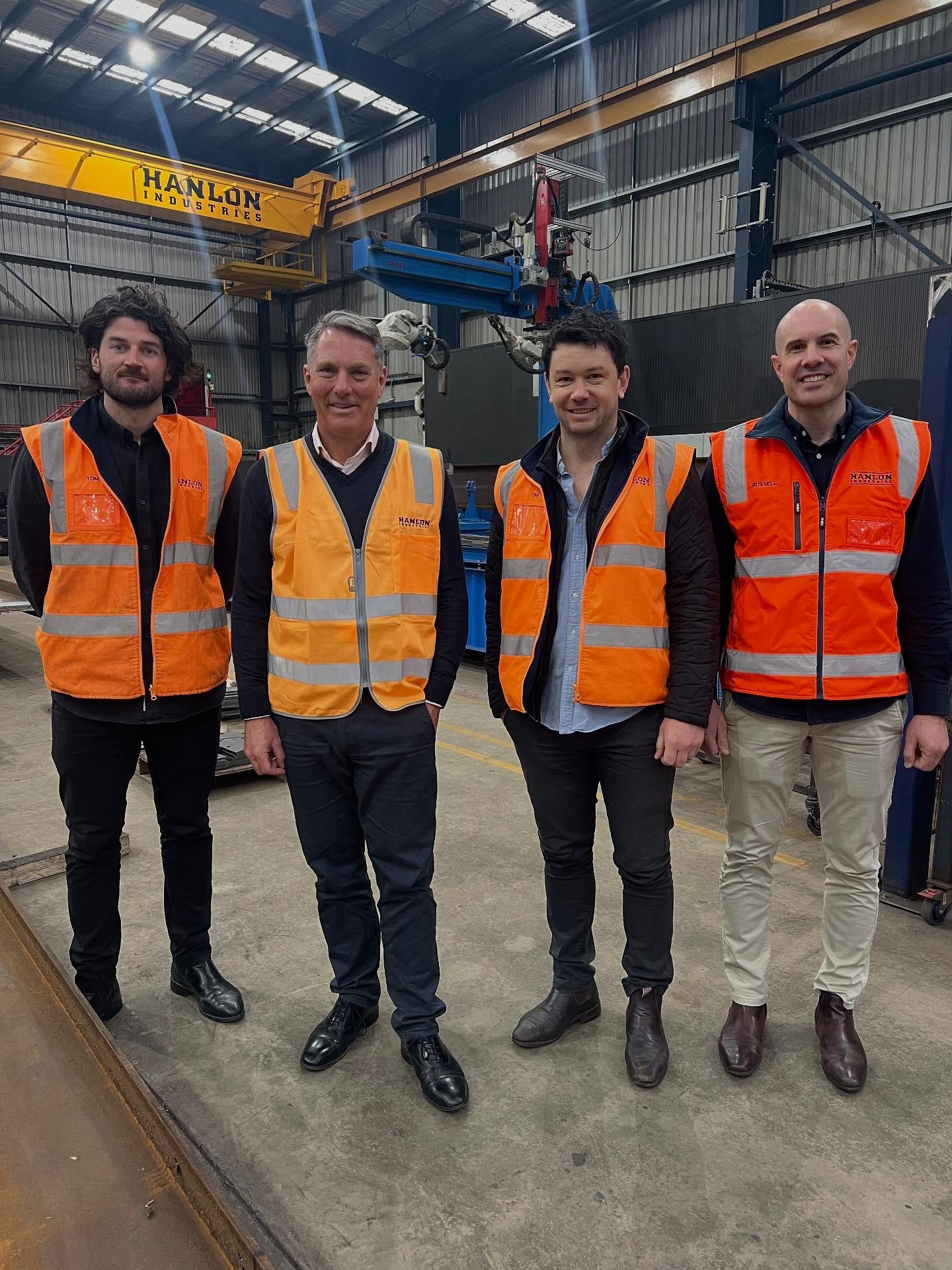Australia to Sign Historic Alliance Treaty with Papua New Guinea ‘In Very Near Future,’ Defence Minister Says
This piece is freely available to read. Become a paid subscriber today and help keep Mencari News financially afloat so that we can continue to pay our writers for their insight and expertise.
Today’s Article is brought to you by Empower your podcasting vision with a suite of creative solutions at your fingertips.
Australia will sign a historic alliance treaty with Papua New Guinea in the very near future, Defence Minister Richard Marles said Tuesday, establishing what would become the nation’s third formal alliance relationship after the United States and New Zealand.
Marles told ABC’s Afternoon Briefing the treaty would formalize security commitments outlined in a communique signed by both prime ministers on Sept. 17, the day after Papua New Guinea’s 50th independence anniversary.
“I mean, it is a historic communique. It paves the way for, really, Australia’s third alliance relationship after the United States and New Zealand,” Marles said. “And I’m confident that that communique will make its way into a signed treaty in the very near future.”
When asked whether the treaty would be signed during Papua New Guinea Prime Minister James Marape’s upcoming visit to Australia, Marles declined to confirm specific timing.
“Well, look, I’m confident that we will be signing that in the very near future. Let me leave it at that,” he said. “But that was very much the sentiment that was expressed on the part of both Prime Ministers when they signed the communique a couple of weeks ago. So, you know, this is imminent.”
Truth matters. Quality journalism costs.
Your subscription to Mencari directly funds the investigative reporting our democracy needs. For less than a coffee per week, you enable our journalists to uncover stories that powerful interests would rather keep hidden. There is no corporate influence involved. No compromises. Just honest journalism when we need it most.
Not ready to be paid subscribe, but appreciate the newsletter ? Grab us a beer or snag the exclusive ad spot at the top of next week's newsletter.
The deputy prime minister spoke following bilateral talks with New Zealand Defence Minister Judith Collins about strengthening defense cooperation between the two nations. Marles said Australia and New Zealand are pursuing unprecedented integration of their defense forces.
“We’re really in a process with New Zealand about looking at how we can literally make our Defence Forces more ANZAC, which is to say, how can we really integrate the New Zealand Defence Force with the Australian Defence Force?” Marles said.
He said the integration efforts are occurring as Australia engages in the biggest increase in defense spending in the nation’s peacetime history while New Zealand moves toward effectively doubling its defense spending.
“How can we procure in a joint way? How can we operate in a joint way? How can we have higher level embeds between our two defence forces? How can we effectively operate as one?” Marles said. “Because the more that we do integrate together, the more we are greater than the sum of our parts.”
The defense minister said New Zealand has announced procurement of Romeo helicopters, a capability Australia also uses, creating opportunities for joint procurement and operations.
Australia and New Zealand will hold their annual ANZMIN meeting, a two-plus-two gathering of defense and foreign ministers, early next year. Marles said Tuesday’s talks focused on preparations for that meeting.
“At the first part of next year, we’ll have our annual ANZMIN meeting. That’s our two plus two meeting with New Zealand. So we’re very focused on that,” he said.
Marles also discussed progress on the Nakamal security agreement with Vanuatu, describing it as a transformative but challenging arrangement for both countries.
“This is a transformative agreement between our two countries. It is a challenging and difficult agreement that we’re trying to put in place for both of us. We really are seeking to transform our relationship,” Marles said.
He said enormous goodwill exists on both sides but the agreement will take time to complete, though he expressed confidence it will be finalized.
The defense minister travels to Fiji on Wednesday for bilateral meetings focused on advancing the defense relationship. He will open the Maritime Essential Services Centre, which he described as “a really important naval and other agency facility for the Fiji Defence Forces.”
“We are very confident about the prospects of progressing our relationship, our defence relationship with Fiji,” Marles said.
He noted Fiji represents one of only a few Pacific nations operating defense forces, alongside Papua New Guinea and Tonga, making the relationship particularly important for regional defense and national security.
“Most Pacific countries don’t,” Marles said of defense forces. “So in a defence and national security sense, the relationship with Fiji is really important.”
On the 20-point Gaza peace plan announced by the United States and Israel, Marles said Australia’s recognition of Palestinian statehood was fundamentally aimed at promoting peace in the Middle East.
“In recognising the Palestinian state, I mean, we were fundamentally acting in accordance with what has been the position of governments of both persuasions in Australia over decades, which is supporting a two state solution,” Marles said.
He said recognition acknowledges the legitimate aspirations of the Palestinian people while understanding that enduring Middle East peace requires fulfilling those aspirations alongside guaranteed Israeli security.
When asked whether Palestinian recognition contributed to the peace plan’s development, Marles said he would not speak for U.S. motivations but emphasized recognition was about promoting peace.
“We very much feel that the step towards recognition in a broader sense is a step towards trying to promote peace in the Middle East,” he said.
Marles welcomed the U.S. proposal, which Israel has agreed to, saying it embodies necessary elements including ending hostilities, returning hostages to Israeli families and flowing humanitarian assistance into Gaza.
“We’ve made it clear that we welcome that,” Marles said. “It actually does embody what I’ve just said in terms of seeing an end to hostility, seeing a return of the hostages, seeing humanitarian aid flow into Gaza.”
He also welcomed the plan’s position on Hamas governance.
“In the governance of the Palestinian territories, there can be no role for Hamas and we welcome that as well,” Marles said.
On reports that China has paused BHP iron ore shipments during negotiations, Marles echoed Prime Minister Anthony Albanese’s concerns while emphasizing the government is monitoring the situation carefully.
“Obviously, we’re looking at this carefully. We do not want to see any hindering of the trade that is undertaken between our two countries in general terms, but specifically in relation to iron ore,” Marles said.
He said the government wants to allow commercial processes to play out while making clear Australia opposes hindered trade beneficial to both countries.
“We understand the terms on which the Chinese economy operates and so this is something with which we are familiar and we want to allow commercial processes to play out and to take their course and that’s appropriate,” Marles said.
Regarding the Pentagon’s review of AUKUS, Marles said the security pact is proceeding on schedule despite ongoing assessment by the Trump administration.
“AUKUS is a program which is underpinned by a trilateral treaty between our three countries. And the point I’d really want to make is AUKUS is happening on this day, out of pace, on time, on schedule, very much to the benefit of all three countries,” Marles said.
He said the review represents a natural step for incoming governments and provides an opportunity to improve AUKUS implementation.
“We did the same thing when we came to government as did the current British government and it affords an opportunity for us all to look at how we can do AUKUS better and that’s how we’re engaging with the review,” Marles said.
The defense minister praised U.S. communication throughout the review process.
“The US has actually been really good in terms of the process of the review keeping us very much informed of that, allowing us to participate in it,” he said.
Marles declined to speculate about review outcomes or timing, saying those matters are for the United States to address.
When questioned about Australian Submarine Agency external contractors spending five times more than anticipated, with one consulting firm receiving $12 million, Marles defended the agency’s performance while acknowledging evolving funding requirements.
“The Australian Submarine Agency, again, is an example of us moving ahead at a pace in relation to AUKUS. We have stood it up. It is starting from scratch doing a completely new task. It is really doing a great job,” Marles said.
He said different numbers will emerge over time but the government understands macro-level funding demands.
“At a macro level, we understand the funding demands in respect of the Australian Submarine Agency. It has a massive job to do that we’ve asked it to do,” Marles said.
The defense minister emphasized the importance of ensuring the agency remains fit for purpose given the challenges it faces.
“It is really important that we continue to make sure that we are fine-tuning it and making sure that it is fit for purpose in terms of all the challenges that it has to face because this is an area where it must succeed, as difficult as the challenge that it’s doing is,” he said.
Marles also addressed the Australian Football League’s decision to eliminate the center bounce, acknowledging emotional attachment to the tradition while expressing faith in the league’s direction.
“There is an emotional attachment to bouncing the ball. And there are some iconic pictures, particularly at the beginning of grand finals, of that first bounce,” he said.
However, he said AFL has evolved into a better spectacle than ever before.
“I actually think the rules of the game are very subtle, they’ve evolved I think really well over the last decade, such that as a spectacle, AFL is better today than it has ever been,” Marles said.
The defense minister’s comments came as Australia pursues an expanding network of Pacific security relationships amid regional strategic competition. The Papua New Guinea alliance treaty would formalize security commitments between the two nations and represent a significant milestone in Australia’s regional defense posture.
Sustaining Mencari Requires Your Support
Independent journalism costs money. Help us continue delivering in-depth investigations and unfiltered commentary on the world's real stories. Your financial contribution enables thorough investigative work and thoughtful analysis, all supported by a dedicated community committed to accuracy and transparency.
Subscribe today to unlock our full archive of investigative reporting and fearless analysis. Subscribing to independent media outlets represents more than just information consumption—it embodies a commitment to factual reporting.
As well as knowing you’re keeping Mencari (Australia) alive, you’ll also get:
Get breaking news AS IT HAPPENS - Gain instant access to our real-time coverage and analysis when major stories break, keeping you ahead of the curve
Unlock our COMPLETE content library - Enjoy unlimited access to every newsletter, podcast episode, and exclusive archive—all seamlessly available in your favorite podcast apps.
Join the conversation that matters - Be part of our vibrant community with full commenting privileges on all content, directly supporting The Evening Post (Australia)
Catch up on some of Mencari’s recent stories:
It only takes a minute to help us investigate fearlessly and expose lies and wrongdoing to hold power accountable. Thanks!








